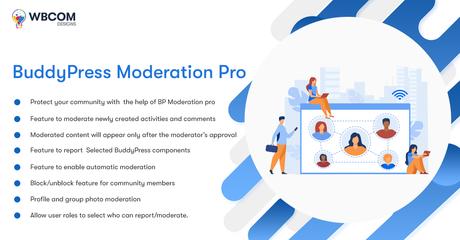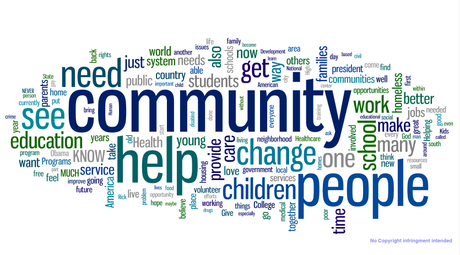Your success is built on your ongoing engagement with your online community. Your online community’s long-term health will depend on how safe and enjoyable your platform is for everyone. This is where online community moderation is so crucial. It’s also why dedicated community management has become so important.
It takes just two or three trolls for a community of 40,000 users to be destroyed. We’ve been there before. We have over 8 years of experience in the community space and can offer tips and best practices to help you manage your online community.
Let’s first look at the definition of moderation in online communities before we get started.
What is online community moderation?
 Online Community Moderation
Online Community Moderation
An online group is an association of people who are connected via the Internet. Moderators are people who act as mediators and keep the discussion within acceptable boundaries. This often involves making decisions about speech and behavior, responding to members’ questions, and issuing warnings when necessary.
Moderation usually involves three elements:
- Curating user-generated content in the online community to ensure its quality and compliance with the organization’s engagement rules.
- Maintaining an atmosphere that encourages honest but appropriate conversation.
- Participation in an online environment that has established and protected the rules of engagement.
BuddyPress Moderation Pro
 Online Community Moderation
Online Community Moderation
BuddyPress Community Modification allows site administrators and site owners to keep their communities in order. The community members can use a community moderation strategy to manage the site. They attach flags to the content.
It also provides buttons and links that enable members to report inappropriate content to their users. Administrators have access to all reports in a sorted table from the wp backend. Administrators can then order/filter the contents and take action.
BuddyPress Moderation Features
- You can choose which BuddyPress component to allow members to report on.
- You can enable auto-moderation for Activity comments, BuddyPress personal messages, or Activity comments.
- Each component can have its limits. Example: Activity stream is removed after 5 reports. After 10 reports, the group directory is deleted.
- You can describe each activity type using these words: To describe individual components, choose words like Report, Flag, or Ban.
- Site administrators can ban members from updating their status.
- Site administrators can block members from accessing private messages.
- Administrators of websites have the option of hiding members who are blocked from their member directory page.
- Site administrators may temporarily disable member accounts.
- Select Hide Mode for reporters and all members. The applicable restrictions may vary depending on the “hide mode” that you choose.
Next, we will help you create a framework to help you keep these three elements.
Also Read: How to Create a Dating Website Using WordPress Plugins
Steps to Effectively Moderate your Online Community
You can learn how to manage your community and help your manager.
1. The Code of Conduct: Rules for member participation
The first step is to prepare a written and downloadable document that can be used for launch.
Online communities should be a place for members to express themselves freely without feeling censored. However, guidelines can help protect both you and the community.
These guidelines should be followed:
- The state expects certain behaviors, as well as those you don’t wish to see.
- Define the purpose of the community and define what it is for.
- Highlight unacceptable content and materials such as pornographic, graphic, or obscene natures.
- You should ban inappropriate behavior, like bullying, hazing, defamation, and intolerance.
- Please describe unacceptable community usages such as commercial advertising, overt self-promotion, or thread hijacking. Also, please explain improper posting practices such as spamming and going off-topic.
- How community members should handle complaints among one another.
- Define the key types of posts that aren’t allowed, such as spam and solicitations.
- This document should be easy to locate, such as a link on your site footer or your community homepage.
- When users log in for the first time, we recommend that they accept these terms and conditions.
Many Online communities platform will have moderation tools that help you monitor this behavior.

2. Create a Clear Escalation Path for Moderating
Once you have created the guidelines, it is your responsibility to make sure that they are followed. Members agree to follow these policies by signing up for an account in the online community.
What happens if they don’t?
To protect your community forum and give your users the benefit, we recommend a 3-strike rule. It is important to have a policy in place from the beginning so that you can always rely on it when you need to support moderation decisions.
How to implement a three-strike policy
Strike 1 – Educate
Notify the member in writing if they violate the guidelines. Most likely, they didn’t know what they were prohibited from doing (yes, even if the Code of Conduct was signed when they joined).
You can educate them about what happened and why they were removed. Then, guide them to positive engagement.
Example: A user posts promotional material for their business when it’s not by the guidelines.
Response: Send an email to the user explaining why this is not allowed. Include a link to a topic relevant to their business and ask them for advice, but don’t sell.
Strike 2 – Moderate
There are no excuses at this point. You should still listen to the user. You can place them in full moderation, and then send another written notice of violation. This will offer to speak on the phone or via video chat about the infraction and the community to you. Keep the process simple and clear by preparing the template in your email.
Strike 3 – Remove
Send a final notice to the person in question and suspend access to the community. You’re out after three strikes. Your team will decide if this is temporary (i.e. Your team will decide if this is a temporary or permanent removal based on the severity and nature of the offense.
TIP – Keep a spreadsheet that lists people who have had moderation issues in the recent past. Also, record how many strikes they received. This will allow you to back up your claims if you remove a member.
Also Read: Benefits of Building an Open-Source Knowledge Base
Public Treatment of Violations
While you don’t want members to be publicly shamed, if everyone has seen the flagged post, then here’s how to remove it.
- Reply to the thread by stating that the post violated the code of conduct. Include specific reasons and links to the guidelines.
- Close the thread.
- If necessary, you can remove the thread. You can decide if you want the thread to be kept as an example of transparency and accountability, or if you prefer it to be removed. It all depends on what type of infraction it is and the guidelines you have.
3. Forcing Infractions Consistently
Even if everyone in your community has signed clear terms of conditions, you still need to have a plan for when you spot a violation.
How will you let the member know that they have broken a rule? You don’t just need to know what a violation looks like and feel confident in your response.
It’s not easy to enforce rules. Telling passionate people that they are acting out of line can prove difficult. It’s essential for the integrity of the community.
4. Setting the tone and letting champions lead by example
 Online Community Moderation
Online Community Moderation
Moderation goes beyond knowing the rules. You are a living example of moderation as a community manager. You can be referred to by anyone unsure of how to start a conversation or what to say in response to X?
A community is much more than this. A good moderator on an online forum can build a community that eventually moderates, giving community members control over what they create and pride.
If the comment isn’t too inflammatory, let it sit for a while before you jump in. Your community should follow your lead and mark it as inappropriate or respond to the troll. If no one steps up, you will be modeling the right behavior.
5. Recruit and train volunteer administrators
Trust your community as it grows and establishes its social norms. Training members, employees, and customers to moderate conversations is part of being a good moderator.
If you did your job well, wrote a great guideline, and modeled good behavior, your customers, employees, or members should be well-trained. They should also be able to maintain valuable discussions and stop unproductive behavior. New employees will find it easier to learn the ropes if they have positive role models to follow.
Your community will be on the right track if it has a moderation team that includes not only employees but also members of the community. They’ll find value in the community, and take ownership of its use.
Also Read: How to Create a Dating Website Using WordPress Plugins
6. Listen to your Community
Listen when something goes wrong. By reaching out to unhappy users, it shows that you care and that you are working to resolve the issue. If this doesn’t feel right, reach out to a manager or executive. A simple gesture like this will make a big difference.
Remember that silence can be your greatest enemy if you are unable to communicate with family members in a crisis. Do not just listen and make up disingenuous responses. Listen to the people you care about and let them know that they are heard.
7. Gaps to be re-evaluated and assessed
Don’t be afraid to change. Your guidelines are not meant to remain static. As more people use your code of conduct, their community norms, mission and goals will change. You should let your community know if you make any changes to the Code of Conduct.
Conclusion on Online Community Moderation

Moderating an online community can be a difficult but rewarding job. You must be able to anticipate and communicate problems before they occur. You also need patience. It takes time for people to get your instructions. So be patient!
Moderators in online communities should not be afraid to take on responsibility and make tough decisions. Although it is not always easy, moderating online communities can bring many benefits. There is more trust among members and peace of mind that all content will be treated fairly.
Interesting Read:
10 Essential BuddyPress plugins For a Community Website
The Best Premium WordPress BuddyPress Themes
Useful Hacks And Customizations For Your BuddyPress Powered Website Via Reign Theme
